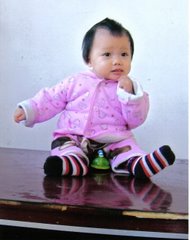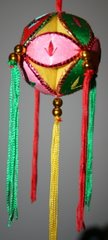

"An invisible red thread connects those who are destined to meet, regardless of time, place, or circumstance. The thread may stretch or tangle, but will never break." - An ancient Chinese proverb.


 What would a Chinese adoption blog be without a mention of Rumor Queen? We were ignorant in the beginning about the glories (and pitfalls) of the constant quest for knowledge about any possible rumour coming out of China with regards to referral dates, how many LID dates would be given referrals, when were TAs (travel approvals) come etc. Not to mention the wealth of information about books to read, things to buy, attachment, bonding, packing lists etc. In April we started gathering with five other couples from this area who were all with our same agency and who had approximately the same LID dates. Four couples actually have the exact same LID date. This group of people, and another couple who joined the group later have all been a wonderful source of support because nobody knows it like those going through it. We have been meeting with these couples monthly since April of 2006. Anyway, they introduced us to Rumor Queen. I avoided it at all costs. My goal was to do as much as possible to make the wait go as fast as possible and not go crazy with every little murmur. However, David became quite a fan and of course kept me updated on every little nuance :-). Anyway, here is a kudos to Rumor Queen because it is an amazing resource.
What would a Chinese adoption blog be without a mention of Rumor Queen? We were ignorant in the beginning about the glories (and pitfalls) of the constant quest for knowledge about any possible rumour coming out of China with regards to referral dates, how many LID dates would be given referrals, when were TAs (travel approvals) come etc. Not to mention the wealth of information about books to read, things to buy, attachment, bonding, packing lists etc. In April we started gathering with five other couples from this area who were all with our same agency and who had approximately the same LID dates. Four couples actually have the exact same LID date. This group of people, and another couple who joined the group later have all been a wonderful source of support because nobody knows it like those going through it. We have been meeting with these couples monthly since April of 2006. Anyway, they introduced us to Rumor Queen. I avoided it at all costs. My goal was to do as much as possible to make the wait go as fast as possible and not go crazy with every little murmur. However, David became quite a fan and of course kept me updated on every little nuance :-). Anyway, here is a kudos to Rumor Queen because it is an amazing resource.







 with our friends. Chinese New Year is the biggest holiday celebrated among Chinese people. Often referred to as the spring festival. Chinese years are grouped in sets of 12 with each year being represented by an animal. It is said that a person displays the characteristics of the animal of the year in which they were born. This is the year of the pig! Our daughter is likely born in the year of the dog, which was last year. I too was born in the year of the dog. Our attributes are that we are responsible, gracious and loyal. It is appropriate that she will be born in the year of the dog since she will join a house with Caleb ("Calabby") our lab and Egan, our Irish Setter. She will also have a cat named Sparkle and a horse called Dan.
with our friends. Chinese New Year is the biggest holiday celebrated among Chinese people. Often referred to as the spring festival. Chinese years are grouped in sets of 12 with each year being represented by an animal. It is said that a person displays the characteristics of the animal of the year in which they were born. This is the year of the pig! Our daughter is likely born in the year of the dog, which was last year. I too was born in the year of the dog. Our attributes are that we are responsible, gracious and loyal. It is appropriate that she will be born in the year of the dog since she will join a house with Caleb ("Calabby") our lab and Egan, our Irish Setter. She will also have a cat named Sparkle and a horse called Dan. 
China is a country whose culture dates back to the earliest records known to man. At first glance, some of China's beliefs may seem quite different than those we hold in the western world. One example of this is the cultural preference for a male child. There are several reasons why Chinese families might prefer a boy over a girl. In rural provinces, a family's livelihood depends directly on the output of its family members. Because of this, a family with sons would be at a considerable advantage than one with daughters. Historically, it is also the son's honored responsibility to take care of his parents in their old age. A daughter, however, would be expected to care for her husband's parents rather than her own. In this regard, the Chinese believe that having a son is crucial to their livelihood, as well as a form of social security for the parents when they grow older. Although in recent years, China has done much to change these belief systems, many families, especially in rural areas, still strongly favor the birth of a male child. This situation is further complicated by China's One-Child Policy, which prohibits families from having more than one child. As a result of this policy, there are thousands of abandoned children throughout China, with the vast majority of them being healthy girls. (Courtesy of America World Adoption Association)
 As with many families, we have been on a very long journey waiting for our baby. For a long time we have wanted to be parents. We started our adoption jouney in 2004. We decided early that we wanted to adopt a daughter from China and quickly settled on GWCA as our adoption agency. We contacted GWCA on May 19, 2004 and received an application from them on June 3, 2004. We were approved by them on June 7, 2004. At that time people were receiving their referrals for their babies within a short time frame - around 6-8 months. To find out more about the infamous Dossier process we went to New Jersey in on October 23, 2004 for an East meets West conference put on by the agency. This was very useful as we find out a lot about the home study process and the daunting paper trail process to complete the Dossier. After that time we started to work on gathering our paperwork and choosing a homestudy agency. The paperwork involved in the dossier could be its own single blog. We had to both have physicals, have Virginia police clearances and child abuse clearances, we had to have letters of references (thanks to our dear friends who wrote such heart warming letters that touched my heart), we had to have letters of employment, we had to proffer all our personal financial history, we needed birth certificates, wedding certificates and DMV clearances for the homestudy. We had to have a homestudy which comprised of four visits from a social worker including an inspection of the home. We also had to be fingerprinted. Once each of these documents were obtained they had to be notarized, then certified by the State Department and then taken to the Chinese Consulate for authentication - lots of seals and lots of money. We also had to submit to USCIS (previously INS) an I600A application to petition to adopt an orphan child. We finally received the last document that we had been waiting for - the I171H which was the USCIS approval of our petition to adopt. Once we received this document in early October 2005, we ran it around to get all appropriate seals and then we put the whole dossier together and sent it off to GWCA on October 7, 2005. The Dossier was mailed to China on October 14, 2005 and we then received our official LID (log in date) of October 28, 2005. We have been waiting since then to hold this precious and much wanted and needed child in our arms. The original referral period starting lengthening right before our LID date and the child that we first thought we would receive by summer of 2006, we now hope to bring home in summer of 2007 but she will be the perfect child for us. We thank every one of family and friends who have so wonderfully help us survive this painfully long wait. This little girl is going to be so loved!!
As with many families, we have been on a very long journey waiting for our baby. For a long time we have wanted to be parents. We started our adoption jouney in 2004. We decided early that we wanted to adopt a daughter from China and quickly settled on GWCA as our adoption agency. We contacted GWCA on May 19, 2004 and received an application from them on June 3, 2004. We were approved by them on June 7, 2004. At that time people were receiving their referrals for their babies within a short time frame - around 6-8 months. To find out more about the infamous Dossier process we went to New Jersey in on October 23, 2004 for an East meets West conference put on by the agency. This was very useful as we find out a lot about the home study process and the daunting paper trail process to complete the Dossier. After that time we started to work on gathering our paperwork and choosing a homestudy agency. The paperwork involved in the dossier could be its own single blog. We had to both have physicals, have Virginia police clearances and child abuse clearances, we had to have letters of references (thanks to our dear friends who wrote such heart warming letters that touched my heart), we had to have letters of employment, we had to proffer all our personal financial history, we needed birth certificates, wedding certificates and DMV clearances for the homestudy. We had to have a homestudy which comprised of four visits from a social worker including an inspection of the home. We also had to be fingerprinted. Once each of these documents were obtained they had to be notarized, then certified by the State Department and then taken to the Chinese Consulate for authentication - lots of seals and lots of money. We also had to submit to USCIS (previously INS) an I600A application to petition to adopt an orphan child. We finally received the last document that we had been waiting for - the I171H which was the USCIS approval of our petition to adopt. Once we received this document in early October 2005, we ran it around to get all appropriate seals and then we put the whole dossier together and sent it off to GWCA on October 7, 2005. The Dossier was mailed to China on October 14, 2005 and we then received our official LID (log in date) of October 28, 2005. We have been waiting since then to hold this precious and much wanted and needed child in our arms. The original referral period starting lengthening right before our LID date and the child that we first thought we would receive by summer of 2006, we now hope to bring home in summer of 2007 but she will be the perfect child for us. We thank every one of family and friends who have so wonderfully help us survive this painfully long wait. This little girl is going to be so loved!! 



















